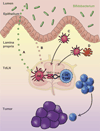Tumor and Host Factors Controlling Antitumor Immunity and Efficacy of Cancer Immunotherapy
- PMID: 26923000
- PMCID: PMC4864964
- DOI: 10.1016/bs.ai.2015.12.003
Tumor and Host Factors Controlling Antitumor Immunity and Efficacy of Cancer Immunotherapy
Abstract
Despite recent clinical advances in immunotherapy, a fraction of cancer patients fails to respond to these interventions. Evidence from preclinical mouse models as well as clinical samples has provided evidence that the extent of activated T cell infiltration within the tumor microenvironment is associated with clinical response to immunotherapies including checkpoint blockade. Therefore, understanding the molecular mechanisms mediating the lack of T cell infiltration into the tumor microenvironment will be instrumental for the development of new therapeutic strategies to render those patients immunotherapy responsive. Recent data have suggested that major sources of intersubject heterogeneity include differences in somatic mutations in specific oncogene pathways between cancers of individual subjects and also environmental factors including commensal microbial composition. Successful identification of such causal factors should lead to new therapeutic approaches that may facilitate T cell entry into noninflamed tumors and expand the fraction of patients capable of responding to novel immunotherapies.
Keywords: Cancer immunotherapy; Microbiota; Tumor biology.
© 2016 Elsevier Inc. All rights reserved.
Figures



References
-
- Abt MC, et al. Commensal bacteria calibrate the activation threshold of innate antiviral immunity. Immunity. 2012;37:158–170. http://dx.doi.org/10.1016/j.immuni.2012.04.011. - DOI - PMC - PubMed
-
- Bak SP, et al. Differential requirement for CD70 and CD80/CD86 in dendritic cell-mediated activation of tumor tolerized CD8 T cells. Journal of Immunology. 2012;189:1708–1716. http://dx.doi.org/10.4049/jimmunol.1201271. - DOI - PMC - PubMed
-
- Baldwin AS. Regulation of cell death and autophagy by IKK and NF-kappaB: Critical mechanisms in immune function and cancer. Immunological Reviews. 2012;246:327–345. http://dx.doi.org/10.1111/j.1600-065X.2012.01095.x. - DOI - PubMed
-
- Basseres DS, Baldwin AS. Nuclear factor-kappaB and inhibitor of kappaB kinase pathways in oncogenic initiation and progression. Oncogene. 2006;25:6817–6830. http://dx.doi.org/10.1038/sj.onc.1209942. - DOI - PubMed
-
- Bedognetti D, et al. CXCR3/CCR5 pathways in metastatic melanoma patients treated with adoptive therapy and interleukin-2. British Journal of Cancer. 2013;109:2412–2423. http://dx.doi.org/10.1038/bjc.2013.557. - DOI - PMC - PubMed
MeSH terms
Substances
Grants and funding
LinkOut - more resources
Full Text Sources
Other Literature Sources

